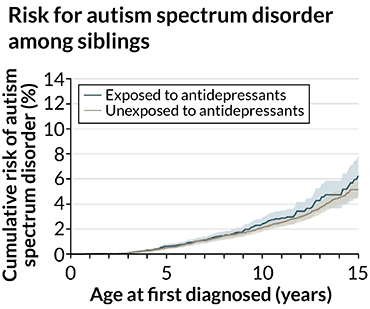Autism, ADHD risk not linked to prenatal exposure to antidepressants
Two new large studies may provide reassurance to pregnant women with depression

SEEKING TREATMENT Pregnant women coping with depression now may have one less thing to worry about: Prenatal exposure to antidepressants doesn’t raise autism risk, two new studies suggest.
wavebreakmedia/Shutterstock
Taking antidepressants during pregnancy does not increase the risk of autism or attention-deficit/hyperactivity disorder, two new large studies suggest. Genetic or environmental influences, rather than prenatal exposure to the drugs, may have a greater influence on whether a child will develop these disorders. The studies are published online April 18 in JAMA.
Clinically, the message is “quite reassuring for practitioners and for mothers needing to make a decision about antidepressant use during pregnancy,” says psychiatrist Simone Vigod, a coauthor of one of the studies. Past research has questioned the safety of expectant moms taking antidepressants (SN: 6/5/10, p. 22).
“A mother’s mood disturbances during pregnancy are a big public health issue — they impact the health of mothers and their children,” says Tim Oberlander, a developmental pediatrician at the University of British Columbia in Vancouver. About one in 10 women develop a major depressive episode during pregnancy. “All treatment options should be explored. Nontreatment is never an option,” says Oberlander, who coauthored a commentary, also published in JAMA.
Untreated depression during pregnancy creates risks for the child, including poor fetal growth, preterm birth and developmental problems. Some women may benefit from psychotherapy alone. A more serious illness may require antidepressants. “Many of us have started to look at longer term child outcomes related to antidepressant exposure because mothers want to know about that in the decision-making process,” says Vigod, of Women’s College Hospital in Toronto.
Previous studies indicated that the use of antidepressants came with its own developmental risks: autism spectrum disorder, ADHD, premature birth and poor fetal growth. “The key question is whether those risks are due to the actual medication,” says psychologist Brian D’Onofrio of Indiana University Bloomington. “Could the negative outcomes be due to the depression itself, or stress or genetic factors?” D’Onofrio and his group authored the other study.
To attempt to isolate the impact of antidepressants on exposed children, both studies relied on big sample sizes and sophisticated statistical techniques. D’Onofrio’s team looked at more than 1.5 million Swedish children born from 1996 to 2012 to nearly 950,000 mothers. More than 22,000, or 1.4 percent, of these kids had mothers who reported using antidepressants, mostly selective serotonin reuptake inhibitors, in the first trimester.
The researchers compared siblings in families where the mother used antidepressants in one pregnancy but not the other. “This helps account for all of the factors that make siblings similar — their shared genetics and environment,” D’Onofrio says.
In the sibling matchup, the children had essentially the same risk for autism, ADHD and poor fetal growth whether they were exposed to antidepressants in the womb or not. There remained a small increased risk of preterm birth among exposed siblings compared to their unexposed siblings.
In the whole sample, looking at antidepressant use only without accounting for other possible influences, “children have roughly twice the risk of having autism if the mother takes antidepressant medication during the first trimester,” says D’Onofrio. “But that association goes completely away when you compare siblings.” Although it’s not clear exactly what’s responsible for the increased risk — depression, stress, genetic factors, poor prenatal care — “our results suggest that it is actually not due to the medication itself,” he says.
Vigod and colleagues looked at mothers who qualified for public drug coverage in Ontario, Canada, from 2002 to 2010. The women gave birth to 35,906 children; in 2,837 of those pregnancies, nearly 8 percent, the women took antidepressants, also primarily selective serotonin reuptake inhibitors. The team compared exposed children to their unexposed siblings, too, and found no association between autism risk and antidepressant use.
“The use of sibling matches in both studies is a very innovative way to account for genetics and a shared environment,” says Oberlander. “We can’t ignore the fact that there are shared genetic mechanisms that might relate autism and depression. The genetic reason that brought the mom to use the drug may say more about the risk of autism in the child.”
Editor’s note: This story was updated May 11, 2017, to correct the reference to the number of mothers who reported using antidepressants during the first trimester of their pregnancies.








